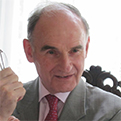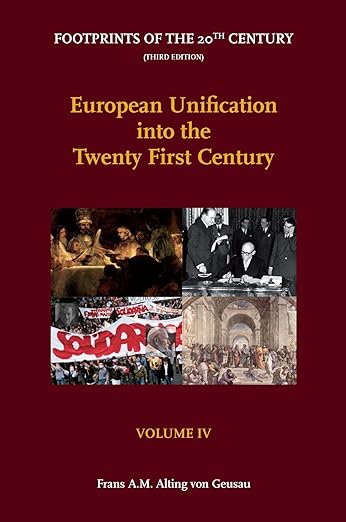ABOUT FRANS A.M. Alting von Geusau
Prof. Jhr. Dr. Frans A.M. Alting von Geusau (1933) studied Law at Leiden University (1952-1958), and European Studies at the College of Europe in Bruges, Belgium (1958-1959). He fulfilled his military service (1953-1955) as an artillery officer in the Dutch Army. He was a research-assistant to Prof. Ernst B. Haas at the University of California (1959-1960). In January 1962 he became a Doctor of Law (L.L.D) at Leiden University upon defence of his dissertation on European Organisations and Foreign Relations of States. A comparative analysis of decision-making. I
He is Professor Emeritus of International Law, Tilburg University (1965-1998) and Western Cooperation, Leiden University (1985-1995) . From 1994 - 2009 he was on the faculty of the Phoenix Institute for the Study of Western Institutions at the University of Notre Dame, Indiana U.S.A, and in 2008 - 2011 Visiting Professor of International Relations in the Advanced LLM program in International Law at Leiden University.
From 1967-1987, he was director of the John F.Kennedy Institute, Center for International Studies. The Institute became well-known through its high level international colloquia, its publication series, the exchange programmes with East-European countries and the international teaching Programme European Studies. From 1964-1971 he was associated with the European Center of the Carnegie Endowment (Geneva) as a member of the permanent study group on international organization. On the invitation of Prof. Lincoln P. Bloomfield he was a visiting Professor at MIT. and visiting fellow at Harvard University. Cambridge, MA. USA. (1971-1972). He was also a Visiting Professor at the University of Michigan, Ann Arbor. USA.. (1977). He was twice invited to be a resident scholar at the Rockefeller Center, Bellagio, Italy (summer 1973 and February 1999). He was a Visiting Scholar at the Wilson Center, Washington DC.(winter 1982) and at the Center for International Affairs. Harvard University (1988-1989). With the Institute for Human Sciences (Institut für die Wissenschaften vom Menschen) in Vienna, he was a member of the Scientific Council (1985-1997) and participated in the Castel Gandolfo talks hosted by Pope John-Paul II.
He also served the Foreign Ministry of the Netherlands as a member of the Advisory Commission on International Law (1965-1998). In this capacity he was a member of the Delegation to the General Assembly of the United Nations (September-December 1973 and 1975). In addition he joined the Advisory Commission on Disarmament and International Security in 1967 and was its Chairman from 1976-1984.
As Chairman of the Academic Lay Mission Action he participated in the foundation of the Netherlands Organisation for International Assistance (NOVIB) in 1961/62. From 1962-1968 he was Chairman of the European Working Group, a European Organisation of young people with Crown Princess Beatrix as President. The Group?s history is well- recorded by Peter Bak in Bewogen en Bevlogen. . Bakker Amsterdam 2005 and Young, inspired and committed. UCL Dutch Studies London 2008 (English translation). Also in 1963 he was the first (acting) director of the Dutch Peace Corps, anounced by Foreign Minister Joseph Luns in February 1963. As the Minister promised, the Dutch Peace Corps - Jongeren Vrijwilligers Programma (JVP) - recruited and sent out 50 Youngster before the end of the year!
In 1973 he was invited to join the European Cultural Foundation as chairman of the Scientific Committee. From 1984-1992 he was the Foundation's Vice-President. On the invitation of Teddy Kollek (Mayor from 1965-1993) he was a member of the Jerusalem Committee from 1978-1993. In 1992 he joined the General Council of the Catholic Charity Aid to the Church in Need (Königstein, Germany) on the invitation of Father Werenfried van Straaten, serving the Charity as Vice-President and Chairman of the Project Commission until June 2008.
Distinctions. He is a knight of the Netherlands Lion (1985); a Commander in the Order of Saint Gregory the Great (1998) and received the Commander's Cross of Merit of the Republic of Poland (2014). Realism and Moralism in International Relations is the title of Essays written in his Honor and edited by Willem J.M. van genugten, Ernst M. Hirsh Ballin,Eric J. Janse de Jonge, Pieter H. Kooijmans. Published by Kluwer Law International 1998.





